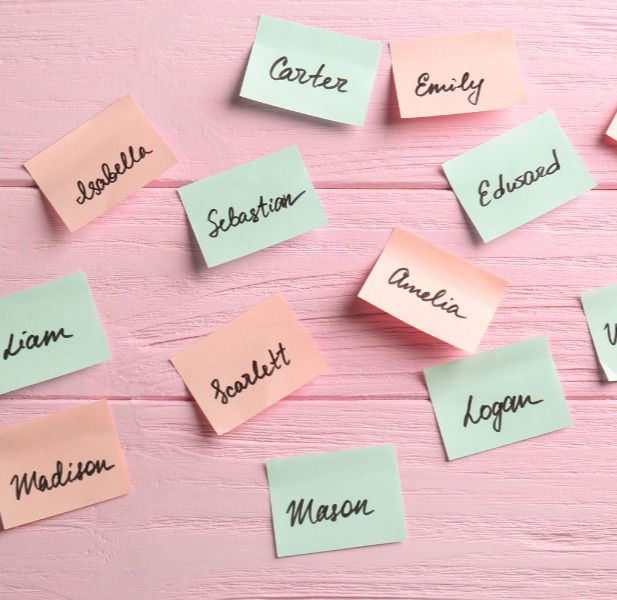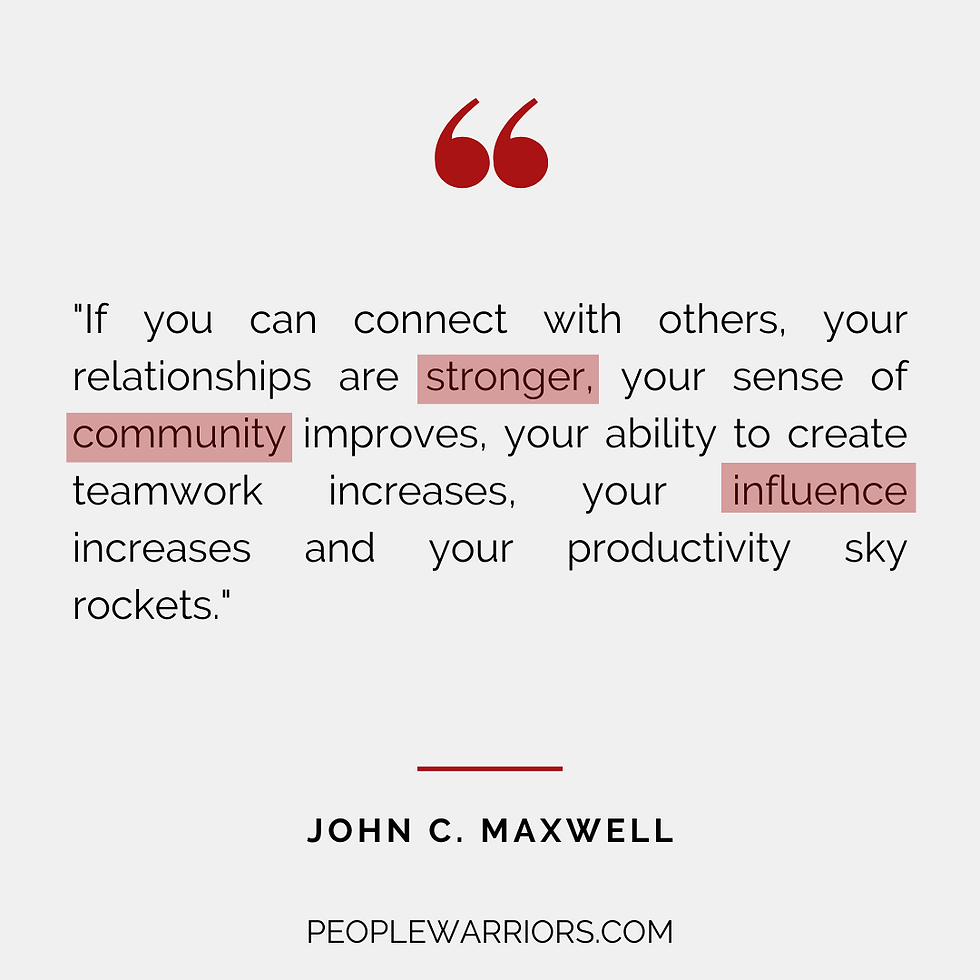
We have all been there. We see someone coming towards us that we recently just met. The person smiles as they recognize you too, ready to greet you. But on the inside you start to panic because you cannot drum up what their name is. You don't want to look rude or like an idiot so you awkwardly yet politely say, "Hi! I am so sorry, I know we just met, but I am just not good with names."
And just like that, an opportunity is lost.
Stop saying "I'm not good with names." Here is why and how.
In my most recent blog post, Are You Giving Off "Future Leader" Vibes, I presented ten great impressions you should be making to show the world you are future leader material. If you missed it, go check it out. I give ten examples of bad, good and great impressions and what each of those great impressions says about you, your professionalism and your leadership potential.
Of all ten, there is one impression in particular (really its a skill) I feel called to expand on and that is remembering names. I feel super strongly about this not only because I hear "I'm not good with names" all the time, but remembering names has become a skill that is socially acceptable to openly and quickly declare to others as a weakness.
No one ever says, "Oh, I am always late," or "I'm not good at meeting deadlines," or "I am terrible at dressing professionally," or "I am not good at preparing for a meetings," or "Yeah, I am not good at making people feel important."
No one would ever openly admit those things (even if they are true)! But how often do we hear others say, or even say ourselves, "I am not good with names?" All the time.
A simple skill with big impacts that all leaders (and future leaders) should "get good" at.
We are 3 weeks into my son's tee ball season. We have had one game and a few practices and the parents and kids are all still getting to know each other. At our last practice, I pulled my chair up to where all the other moms were already set up and one mom greeted me with a big smile, "Hi Heather! How are you? How was your long weekend?"
That made me feel awesome! It felt great that someone was genuinely excited to talk to me. I felt remembered and valued. Clearly our last conversation, however brief it was, left enough of a positive impression that she remembered me. It also made me feel like "one of the moms". Many of the other Moms already know each other so in that moment I felt a sense of belonging.
If someone remembering my name at a five and under tee ball practice made me feel important, imagine how it makes people feel in the workplace where the need for acknowledgment, belonging, and the need to feel valued, important and appreciated are ten fold?

The very foundation of connecting with another person begins simply by remembering and using their name. It instantly makes others feel memorable, valued, important and cared for. And if you are eager to grow your leadership and influence with others, you are going to want to "get good" at making others feel this way.
5 Simple Tricks to "Get Good" at Remembering Names
#1 - Repeat it Back Immediately (And Ideally Three Times)
This trick is a win win. It's a great way to engrain their name in your memory on the spot, and it also shows the other person that you are listening, that you care and that you are genuinely interested in the interaction. Here is how to sneak this into your conversation like a pro:
Repeat their name the first time immediately after they introduce themselves. You could do this as a way to confirm you heard them correctly or to lead you into your side of the introduction - "Megan, I'm Heather," or "I'm Heather; it's nice to meet you Megan." If it's a tough name to pronounce, you can always ask them to repeat it or spell it. If you are having trouble understanding it, you likely aren't the first and they will respect you for attempting to get it right.
Sneak the second repeat into the meat of the conversation. "Yes, Megan, I completely agree!" or "How old are your kids, Megan?" or "Megan, are you from around here?" It may feel a bit strange at first because we don't typically use first names outside of greetings or goodbyes, but after a few times it will feel much more natural.
For the third and final repeat, use their name when you are closing out the engagement. "Megan, it was so nice to meet you," or "Megan, I really appreciate your time," or even just a simple "and it was Megan, right?" as a way to show them one last time that you don't want to forget their name and you want to make sure you got it right.
If you are meeting more than one person at a time this of course will become trickier. If it's appropriate, you could just take a moment during or at the end of the conversation to quickly go around the group and repeat everyone's names, kind of like a personal pop quiz. Not only will it help you remember everyone's names but they will be super impressed and touched that you care enough to do that. If it isn't appropriate to do this out loud, maybe there are too many people or maybe you missed your chance, you can still repeat names in your head.
#2 - Write it down.
Whether you are meeting one new person or two dozen, writing down names is a great way to not just engrain it to memory right away but to also have something to reference back to if you find yourself about to engage with that person or group of people again in the near future.
If you are in a situation where you already have a pen and paper in front of you (i.e. a meeting, conference, class, zoom calls, etc.) you can write names down as people go around the room and introduce themselves. In these situations I always suggest writing on paper verses on your phone because you don't want to look like you are not paying attention while people introduce themselves. People won't be able to tell if you are typing names in phones or responding to an email.
When meeting just one person or a small group of people, writing names on the fly isn't possible and might awkwardly take you away from the engagement. In this case, immediately write their names in your phone or wherever handy after the conversation has ended (i.e. back in your car, at your desk, etc.). Be sure write down when and where you met them and any key details about them you may want to remember when you see them again.
#3 - Make up clever nicknames in your head.
Remember in grade school when the teacher would ask you to introduce yourself and give an adjective that described you that started with the same letter as your first name? I was always Happy Heather (and I like to think I still am). This simple, elementary activity works for grown ups as well. In fact, that activity was less about the students learning each others' names and more for the teachers to learn the students' names.
The fancy term for it is called using mnemonic devices, where you use acronyms, associations, or even rhythms and music to help you memorize something. Acronyms and associations as very common and easy mnemonic devices to use when trying to remember names.
When meeting someone new, try and find something really distinctive about that person and then relate it back to their name. Maybe it's something about their appearance like an awesome pair of shoes or jacket. Maybe it's something about their personality or energy they give off. Maybe it's something you learned about them (like they have five children, love to golf or where they originally came from).
Finding something with the name first letter as their first name is certainly helpful, but it isn't necessary. Just focus on that one distinctive thing, tie it to their name and repeat that in your head three times (baseball Craig, baseball Craig, baseball Craig).
#4 - Make a Personal Challenge
I recently joined my church choir. Before our first choir practice, I knew I was about to meet probably 40 new people all at once. There was no way I could remember all 40, but I could remember 5 to 8. And if I could remember 5 to 8 names, then I could make meaningful connections with 2 or 3 people - meaning their name and distinctive details about them that I could refer back to when I see them again at the next choir practice.
When you find yourself about to be in a situation where you are going to be meeting people for the first time - whether its a few or 50 - make a personal challenge ahead of time to come out of the experience remembering 2, 3 or 4 names. It's ok to start small.
Once you set this mental goal, you enter into the engagement on a mission to connect and listen. You will find yourself more present in conversations, filing away detail after detail and name after name in your mind. You will be surprised by how much you actually retain verses if you hadn't gone in with an intentional plan. And when the event is over and you are by yourself, immediately write down any names you learned and distinctive details about each person.
#5 - Remember Why It Matters
Brain coach and founder of Kwik Learning & SuperheroYou, Jim Kwik, is an expert in speed-reading, memory improvement, brain performance and accelerated learning. In a memory training video shared with CNBC, Kiwk says "Motivation is the force that drives memory." He states that if you aren’t clear with yourself that it is important for you to remember a new acquaintance’s name, you won’t.
“Imagine that there is a suitcase of $100,000 cash — $100,000 cash for you or the charity of your choice if you just remember the name of the next person you meet? Are you going to remember that person’s name? Of course you are. You are going to be a memory expert. So it has nothing to do with your capacity or your capability or your potential,” - Jim Kwik
Whether you are meeting a new teacher, new classmates, a new neighbor, a new team with your new company, new faces in your community or new business leaders your ability to remember names has nothing to do with your actual memory capabilities, and everything to do with remembering why it matters.

Is this really that big of deal?
Depends. It does not carry the same weight as being late or missing deadlines, but it's a super small action that can leave lasting impressions. And, as author Charles Chestnutt says, we sometimes underestimate the influence of the little things.
For anyone with a passion or interest to increase their influence and leadership with others, being intentional about remembering names is small but meaningful skill I strongly encourage you to master.

Comments